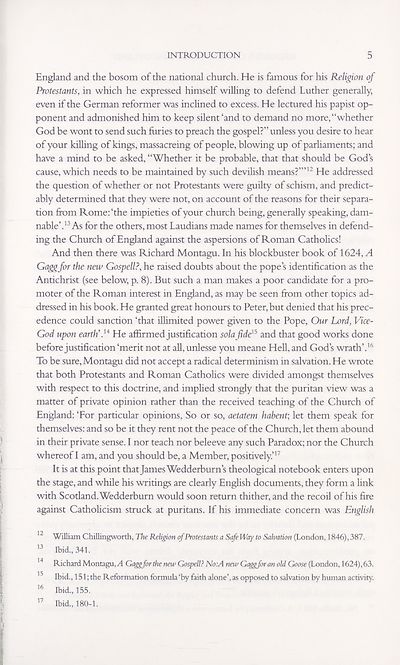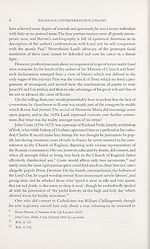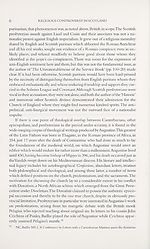Series 5 > Religious Controversy in Scotland 1625-1639
(20) Page 5
Download files
Complete book:
Individual page:
Thumbnail gallery: Grid view | List view

INTRODUCTION
5
England and the bosom of the national church. He is famous for his Religion of
Protestants, in which he expressed himself willing to defend Luther generally,
even if the German reformer was inclined to excess. He lectured his papist op¬
ponent and admonished him to keep silent ‘and to demand no more, “whether
God be wont to send such furies to preach the gospel?” unless you desire to hear
of your killing of kings, massacreing of people, blowing up of parhaments; and
have a mind to be asked, “Whether it be probable, that that should be God’s
cause, which needs to be maintained by such devilish means?”’12 He addressed
the question of whether or not Protestants were guilty of schism, and predict¬
ably determined that they were not, on account of the reasons for their separa¬
tion from Rome: ‘the impieties of your church being, generally speaking, dam¬
nable’.13 As for the others, most Laudians made names for themselves in defend¬
ing the Church of England against the aspersions of Roman Catholics!
And then there was Richard Montagu. In his blockbuster book of 1624, A
Gaggfor the new Gospell?, he raised doubts about the pope’s identification as the
Antichrist (see below, p. 8). But such a man makes a poor candidate for a pro¬
moter of the Roman interest in England, as may be seen from other topics ad¬
dressed in his book. He granted great honours to Peter, but denied that his prec¬
edence could sanction ‘that illimited power given to the Pope, Our Lord, Vice-
God upon earth’.14 He affirmed justification sola fide'5 and that good works done
before justification ‘merit not at all, unlesse you meane Hell, and God’s wrath’.16
To be sure, Montagu did not accept a radical determinism in salvation. He wrote
that both Protestants and Roman Catholics were divided amongst themselves
with respect to this doctrine, and implied strongly that the puritan view was a
matter of private opinion rather than the received teaching of the Church of
England: ‘For particular opinions, So or so, aetatem habenV, let them speak for
themselves: and so be it they rent not the peace of the Church, let them abound
in their private sense. I nor teach nor beleeve any such Paradox; nor the Church
whereof I am, and you should be, a Member, positively.’17
It is at this point that James Wedderburn’s theological notebook enters upon
the stage, and while his writings are clearly English documents, they form a link
with Scotland. Wedderburn would soon return thither, and the recoil of his fire
against Catholicism struck at puritans. If his immediate concern was English
12 William Chillingworth, The Religion of Protestants a Safe Way to Salvation (London, 1846), 387.
13 Ibid., 341.
14 Richard Montagu,/! Gaggfor the new Gospell? No:A new Gaggfor an old Goose (London,1624),63.
15 Ibid., 151; the Reformation formula ‘by faith alone’, as opposed to salvation by human activity.
16 Ibid., 155.
5
England and the bosom of the national church. He is famous for his Religion of
Protestants, in which he expressed himself willing to defend Luther generally,
even if the German reformer was inclined to excess. He lectured his papist op¬
ponent and admonished him to keep silent ‘and to demand no more, “whether
God be wont to send such furies to preach the gospel?” unless you desire to hear
of your killing of kings, massacreing of people, blowing up of parhaments; and
have a mind to be asked, “Whether it be probable, that that should be God’s
cause, which needs to be maintained by such devilish means?”’12 He addressed
the question of whether or not Protestants were guilty of schism, and predict¬
ably determined that they were not, on account of the reasons for their separa¬
tion from Rome: ‘the impieties of your church being, generally speaking, dam¬
nable’.13 As for the others, most Laudians made names for themselves in defend¬
ing the Church of England against the aspersions of Roman Catholics!
And then there was Richard Montagu. In his blockbuster book of 1624, A
Gaggfor the new Gospell?, he raised doubts about the pope’s identification as the
Antichrist (see below, p. 8). But such a man makes a poor candidate for a pro¬
moter of the Roman interest in England, as may be seen from other topics ad¬
dressed in his book. He granted great honours to Peter, but denied that his prec¬
edence could sanction ‘that illimited power given to the Pope, Our Lord, Vice-
God upon earth’.14 He affirmed justification sola fide'5 and that good works done
before justification ‘merit not at all, unlesse you meane Hell, and God’s wrath’.16
To be sure, Montagu did not accept a radical determinism in salvation. He wrote
that both Protestants and Roman Catholics were divided amongst themselves
with respect to this doctrine, and implied strongly that the puritan view was a
matter of private opinion rather than the received teaching of the Church of
England: ‘For particular opinions, So or so, aetatem habenV, let them speak for
themselves: and so be it they rent not the peace of the Church, let them abound
in their private sense. I nor teach nor beleeve any such Paradox; nor the Church
whereof I am, and you should be, a Member, positively.’17
It is at this point that James Wedderburn’s theological notebook enters upon
the stage, and while his writings are clearly English documents, they form a link
with Scotland. Wedderburn would soon return thither, and the recoil of his fire
against Catholicism struck at puritans. If his immediate concern was English
12 William Chillingworth, The Religion of Protestants a Safe Way to Salvation (London, 1846), 387.
13 Ibid., 341.
14 Richard Montagu,/! Gaggfor the new Gospell? No:A new Gaggfor an old Goose (London,1624),63.
15 Ibid., 151; the Reformation formula ‘by faith alone’, as opposed to salvation by human activity.
16 Ibid., 155.
Set display mode to:
![]() Universal Viewer |
Universal Viewer | ![]() Mirador |
Large image | Transcription
Mirador |
Large image | Transcription
Images and transcriptions on this page, including medium image downloads, may be used under the Creative Commons Attribution 4.0 International Licence unless otherwise stated. ![]()
| Scottish History Society volumes > Series 5 > Religious Controversy in Scotland 1625-1639 > (20) Page 5 |
|---|
| Permanent URL | https://digital.nls.uk/127328205 |
|---|
| Description | Over 180 volumes, published by the Scottish History Society, containing original sources on Scotland's history and people. With a wide range of subjects, the books collectively cover all periods from the 12th to 20th centuries, and reflect changing trends in Scottish history. Sources are accompanied by scholarly interpretation, references and bibliographies. Volumes are usually published annually, and more digitised volumes will be added as they become available. |
|---|


